- Home
- About
Initially focusing on renewable energy, Green Britain Group founder Dale Vince has brought green principles to transport, food, sport, telecoms, jewelery and more
By launching Ecotricity in 1995, Dale kickstarted the Global Green Energy Movement. In 2011, he started the world’s first national charging network for electric cars, and under his ownership Forest Green Rovers have become the world’s first vegan and UN-certified carbon-neutral football club. Dale and the Green Britain Group have a reputation for doing things first. Each new venture uses 21st century technology and innovative thinking to tackle the climate crisis with better and greener ways of doing things.

Our History
For more than a quarter of a century, companies in the Green Britain Group have been offering businesses and consumers an alternative to the status quo. Changing industries that are entrenched in outmoded ways of thinking hasn’t always been easy, but each company’s successes speak for themselves...
Ecotricity – the world’s first green energy company Ecotricity was founded in 1995 by Dale Vince, with the construction of the company’s first wind turbine. Building a windmill wasn’t the main challenge – it was being able to sell energy at a fair price. After a great deal of research, the company opted for an embedded supply model, using the local grid to match customers with energy generated rather than selling kilowatt hours to MEB, which had the local energy monopoly in the Stroud district at the time. Ecotricity became an energy company – rather than just a generator – when it began selling green electricity to its first customer, Cheltenham and Gloucester College, on 1 April 1996. In doing so, the company became the world’s first supplier of green electricity.
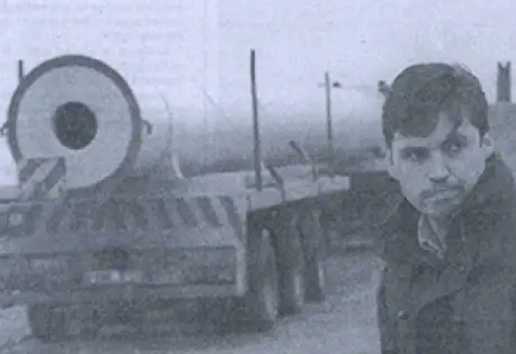
In 1995, Dale oversaw the construction of Ecotricity's first windmill – the first of many we have built to supply Britain with green energy.
Ecotricity quadruples turnover with joint venture Teaming up with Thames Water, Ecotricity expanded its capacity to supply green electricity to customers. In part thanks to the deal, the company quadrupled its turnover to £50 million during 1998. Although the joint venture broke apart two years later, it was an important stage in the development of Ecotricity and its vision to supply green electricity to consumers across Britain. The following year, Ecotricity installed the UK’s first multi-megawatt wind turbine at Ecotech in Norfolk, which later became the Green Britain Centre.
Ecotricity supplies green energy to consumers
By 2003, Ecotricity had built a strong reputation as a supplier of green energy to business customers. Now, the company was ready to start supplying the domestic market giving everyone the chance to join the green energy revolution by becoming Ecotricity customers. By the end of the year, 3,000 homes had switched to Ecotricity. That number would grow and grow, making Ecotricity a household name and a leading brand championing sustainability in businesses, public bodies and in the home.
It's always a proud moment when a new windmill is erected and we can start supplying renewable energy to nearby homes and businesses.
Rapid growth in Ecotricity’s domestic supply business
Green energy caught the imagination of consumers and in 2006 the domestic supply part of Ecotricity’s business grew by 10,000 homes, equivalent to 77% year on year, to a total of 23,000. Six new wind turbines were added to the company’s Bambers wind park in Lincolnshire. On the Merchant Wind Power side of the business, Ecotricity built two turbines at the Michelin tyre factory in Dundee, having already installed turbines for Sainsbury’s, Ford and at Green Park in Reading.
We have added significantly to our wind park near Mablethorpe, Lincolnshire, where we capture the energy of the wind blowing off the North Sea and use it to power homes and businesses across Britain.
Ecotricity undented by financial crisis
Ecotricity’s organic growth trajectory meant the company was fairly well insulated when the financial crisis hit and in 2008 the company built 21 new wind turbines, almost doubling its wind power infrastructure. On the research and development side, work began on attempts to break the wind-powered land speed record with Greenbird, and the development of the Nemesis electric supercar.
The credit crunch didn't hold us back. In 2008 we moved forward boldly with our construction plans and also introduced our Green Union Jack.
Dale Vince invests in Forest Green Rovers
At the end of the 2009-10 football season, Forest Green Rovers were nearly relegated from the Football Conference and faced the threat of bankruptcy. Ecotricity owner Dale Vince stepped in to become the majority shareholder. Initially, the aim was to rescue his local football club, but Dale saw the opportunity to make the organisation more sustainable by addressing its choices regarding food, transport and energy. He set FGR on the road to becoming a leader in sustainability in sport. Originally founded in 1889, the club is now a pioneer in the modern age.
Green Gas tariff and solar power for Ecotricity
2010 saw Ecotricity become the first energy company to offer its customers a truly green dual fuel tariff with the introduction of the Green Gas tariff. The company also introduced its first ecobonds, enabling customers to help support the construction of green energy infrastructure and reap the benefits of doing so. Work began on Ecotricity’s first ever sun park, which began supplying to the grid the following year.
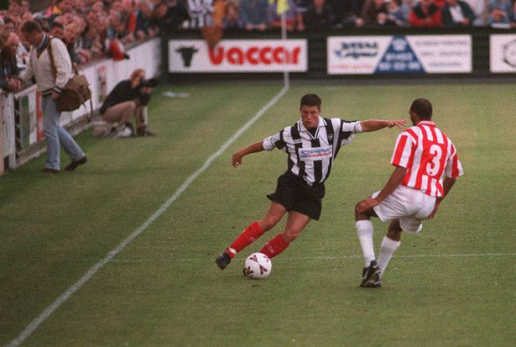
Electric Highway leads the way in EV charging
Electric Highway was founded by Dale Vince as a sister company to Ecotricity, with the aim of providing electric vehicle charge points across the UK. At the time, three-pin-plug chargers were the norm and 7kW was considered fast. Charging rates progressed to 50kW, then 150kW and beyond, alongside advances in EV technology. So that Electric Highway could progress to the next stage in the electrification of British transport, the company was sold to GRIDSERVE in 2021.
Ion Horse electric superbike developed
With backing from Ecotricity founder Dale Vince, the Ion Horse electric superbike was engineered at Kingston University with lithium polymer cobalt cells capable of achieving 0-60mph acceleration in three seconds, and a top speed of 140mph. After competing in the Isle of Man TT Zero rally in 2011, 2012 and 2013, Ion Horse has become the inspiration for the Ion high performance electric transportation brand, which will include the Ion hovercraft and other exciting vehicles still in development.
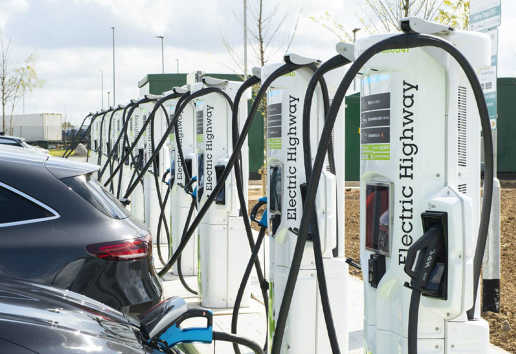
With EV charging stations around the country, The Electric Highway is cutting emissions on Britain's roads and charging electric cars with green energy generated by the sun and the wind.
Green Britain Foundation registered as a charity
In 2012, the Green Britain Foundation was registered as a charity, enabling Ecotricity and its sister companies to raise money and carry out charitable activities that help people reduce their carbon footprint. There are four pillars to the foundation's approach, which include what we eat, how we travel, how we power our lifestyles and how we protect and improve the natural world. The Green Britain Foundation provides data, insight and information supporting the changes that need to be made for a truly green Britain.
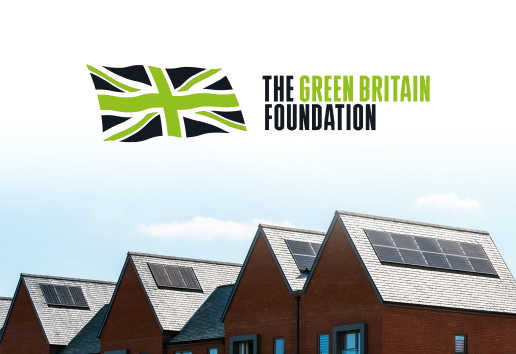
Britwind begins manufacturing In 2014, Britwind was launched with the aim of making wind energy accessible and affordable for landowners and SMEs throughout Britain and around the world. Based in Gloucestershire, the company manufactures two models, designed and engineered in Britain, generating 5kW and 20kW respectively. Britwind leverages all of Ecotricity’s experience in building and managing large-scale onshore wind farms, putting this expertise at the disposal of its customers who want to join the green revolution, meet their sustainability targets and enjoy lower energy bills. First steps towards Eco Park In December 2014, Dale Vince told local news outlets that Ecotricity was exploring the option to buy land near the M5 in order to give Forest Green Rovers a new home. The concept of Eco Park was born and in subsequent years planning applications were made, with architectural drawings for a state-of-the-art, all-wood stadium created by architects Zaha Hadid. Plans have evolved to include a training facility, green enterprise hub and hotel, with 80% of the energy requirement generated on site. Thousands of new trees and 2km of hedgerows will be planted along with wetland restoration and a projected 12% improvement to local biodiversity. The project has the potential to support 5,000 new jobs in the area. Ecotricity reaches 150,000 customers In one of the biggest years in the company’s history, Ecotricity doubled in size during 2014 and was then supplying over 150,000 customers. At the same time, it topped the Which? Best Energy Company survey for receiving the least customer complaints for a fifth year running. Ecotricity continued to expand its generation assets with its 19th wind park, situated at Galsworthy, Devon.
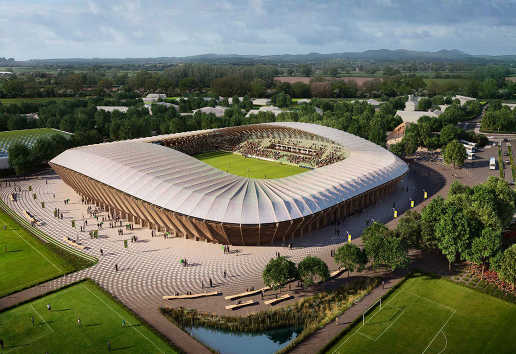
Green gas mill plans unveiled As an alternative to burning fossil fuel natural gas, Ecotricity announced plans to build green gas mills, which will turn grass cuttings into methane through a process of anaerobic digestion. The gas can seamlessly enter Britain’s gas grid, replacing imported fossil fuel gas. Meanwhile, the CO2 emitted when it’s burned will be absorbed by the re-growth of the grass. More recently, Dale Vince has encouraged the government to invest in green gas mills rather than pursuing the installation of 30 million air source heat pumps.
Our green gas mills are set to revolutionise Britain's gas grid by replacing fossil fuels with sustainable green gas made out of... green grass.
Forest Green Rovers enter the English Football League
On 14 May 2017, at Wembley Stadium, Forest Green Rovers defeated Tranmere Rovers 3-1 with two goals from Kaiyne Woolery and one from Christian Doidge, securing promotion from the National League into the English Football League for the first time in the club’s history. Along with its business ramifications, promotion put the club and its green agenda on the national stage. The success was repeated on 7 May 2022, when a 2-2 draw away to Mansfield Town saw FGR crowned Champions of League Two, making the step up to League One for the 2022-23 season.
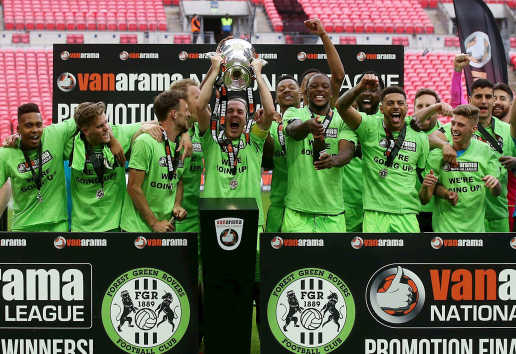
Ecotalk gives back to nature
June 2018 saw the launch of a different kind of mobile phone service. Running on the EE network, Ecotalk provides the best coverage on the market, runs using renewable energy and harnesses users’ mobile phone bills to give back to nature. Revenue generated by the company is used to buy land carefully selected for rewilding, helping tackle Britain’s loss of wildlife by creating areas where indigenous wildflowers, insects, birds and mammals can thrive once again. Partnered with the RSPB, Ecotalk and has projects running at Lynch Knoll in Gloucestershire, Fairburn Ings in West Yorkshire and Horse Common in Hampshire.
The world’s first carbon neutral football club
Under the UN Framework Convention on Climate Change initiative, the United Nations in New York awarded Forest Green Rovers the Climate Neutral Now Prize for becoming the first certified carbon neutral football club in the world. Accepting the prize, Dale Vince spoke about the sustainable food, energy and transport measures the club has introduced to make it the world’s greenest football club.
We launched Ecotalk so that people can use an eco-friendly mobile network, and the money it earns is used to protect ecosystems that are home to vital pollinators such as bees.
Ecotricity declares climate emergency
Calling for a target of carbon neutrality for Britain by 2025, Ecotricity became the first and only energy company to declare that the world faces a climate emergency in 2019. The company continued working on its green gas mills project and unveiled three new sun parks, situated in Devon, Lincolnshire and Somerset, while also developing its smart grid and battery network to better distribute renewable energy.
zerocarbonista podcast launched
In October 2019, Dale Vince began recording his zerocarbonista podcast, a programme discussing how the climate emergency can be tackled at international, national, local and individual levels. Steps taken by governments and international bodies are analysed and critiqued, while at the same time listeners are invited to contact the show with their own questions, comments and suggestions, which are addressed in each episode by Dale and his host.
Skydiamond mines the sky to save the Earth
In October 2020, Skydiamond was launched offering high quality diamonds made using excess carbon taken from the atmosphere, rainwater and wind and solar energy. Physically and chemically identical to mined diamonds, Skydiamonds come with none of the ecological downsides such as carbon emissions, damage to the landscape, air and water pollution or disruption to wildlife. Skydiamond proves that consumers can enjoy the good things in life sustainably, and is working with leading jewellery designers on collections celebrating these ethical gems.
Green Britain Group formed
In order to bring Ecotricity and its associated sister businesses into a single, cohesive unit, Dale Vince founded the Green Britain Group in 2020. At the time, its main operations were Ecotricity and Forest Green Rovers football club, along with Skydiamond and Ecotalk. Subsequent years would see further innovative brands added to the Green Britain Group portfolio – all in pursuit of sustainability through business.

Skydiamond sustainable diamonds go beyond carbon neutral to carbon negative – by design.
Devil’s Kitchen ships plant-based foods
Building on experience gained developing the vegan menu at Forest Green Rovers and Little Green Devils catering, Dale Vince launched the Devil’s Kitchen brand in 2021 with a menu of 100% plant-based products including shiitake mushroom burgers, Jamaican jerk burgers, spicy vegan balls, Thai green curry balls, Moroccan vegetable balls and more. Healthy and offering exceptional flavour, Devil’s Kitchen products are free from palm oil, soya and all 14 major food allergens. The range comes in eye-catching, compostable packaging, zero air-freighted ingredients are used, and the foods are made in a purpose-built facility in Gloucestershire. Devil’s Kitchen products are available on Ocado and in a growing number of specialist vegan retailers.
Schools go green with MEE
The Ministry of Eco Education launched in 2021, working with teachers and leading environmental organisations to rearrange the national curriculum for England with a focus on sustainability. Working with a growing number of primary schools around the country, MEE focusses on developing human agency and empowering young people as they learn about nature, the climate crisis, sustainability, renewable energy and more. Teaching guides are available, helping schools introduce the new green curriculum, which meets all national curriculum standards.
GreenCode certification for businesses
Launched in 2021, the GreenCode sustainability accreditation scheme supports organisations wanting to improve their environmental credentials. Using experience gained while developing Ecotricity and Forest Green Rovers into world-leading sustainable businesses, GreenCode reduces the cost and complexity of accreditation while providing sound advice. By earning the Official GC mark, organisations can demonstrate their adherence to rigorous environmental standards to their customers, partners, suppliers and communities.

MEE brings together all the best sustainability teaching resources available into one cohesive and holistic curriculum for all primary schools in Britain.